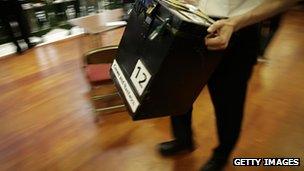Nine cities reject elected mayors
-
Published

David Cameron's plans to replace local council cabinets with directly elected mayors have been rejected by voters in nine English cities.
Birmingham, Manchester, Newcastle, Nottingham, Sheffield, Wakefield, Coventry, Leeds and Bradford voted "no" to the idea, championed by ministers.
But Bristol was in favour and Doncaster voted to keep its mayor.
Voter turnout has been low and housing minister Grant Shapps said no-one was "forcing" mayors on cities.
Manchester voted against the proposal by a margin of 53.2% to 46.8%. In Nottingham the margin was bigger at 57.5% to 42.5%. And in Bradford 55.1% of voters opposed the change.
Turnout in Manchester and Nottingham was 24%. In Bradford it was slightly higher at 35%.
In Leeds the idea of a mayor was rejected by 67% to 33%.
Nottingham council's Labour leader Jon Collins said the referendum had been "imposed" on the city by the coalition government and introducing a mayoral system would be "expensive and unnecessary".
"This outcome shows that local people recognise we have a system in Nottingham which is working well for them and the city," he added.
In Birmingham voters rejected the plans by 57.8% TO 42.2% and in Coventry by 63.58% to 36.42%.
But those in Bristol backed change by a margin of 53% to 47%, on a turnout of 24%.
The contest for the new job will take place in the autumn.
People in Doncaster were offered the chance to do away with an elected mayor, which they voted to introduce in 2001. They rejected the idea by 62% to 38%.
Conservative minister Mr Shapps told Sky News: "People should have the right to decide how they are governed in their local area.
"The whole point is to give people a say. No-one is forcing mayors on anyone."
· All the latest election results are available at bbc.co.uk/vote2012
-
-
Published4 May 2012
-
-
-
Published4 May 2012
-
-
-
Published4 May 2012
-
-
-
Published4 May 2012
-
-
-
Published4 May 2012
-